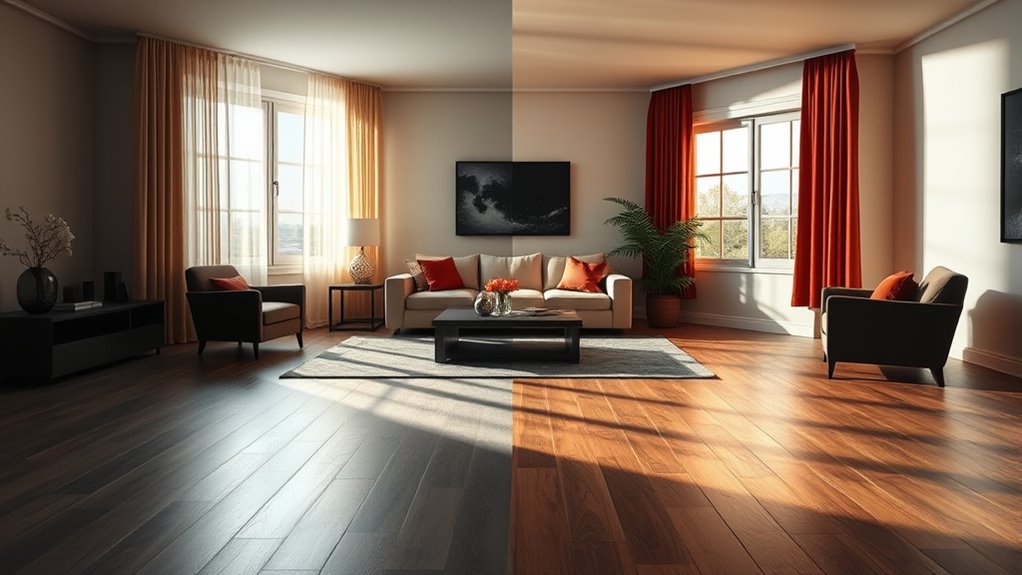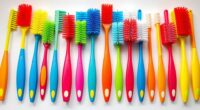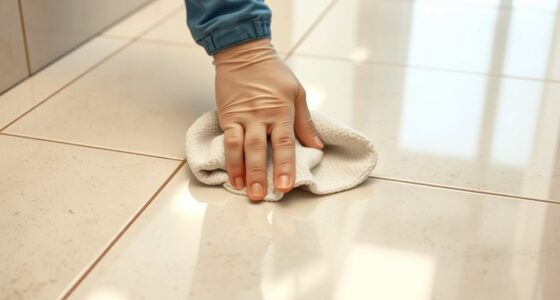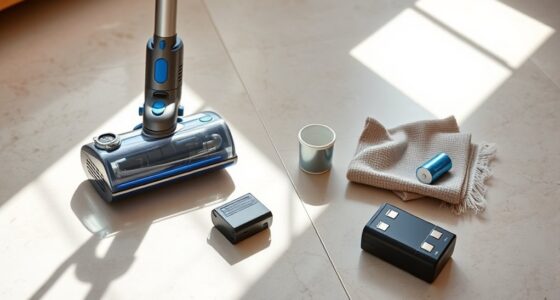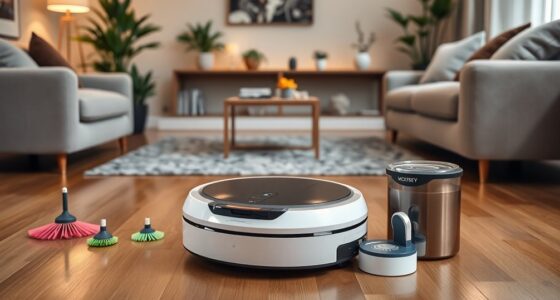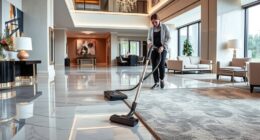Cleaning your vinyl plank floors during the day offers better visibility, safety, and thoroughness because natural light reveals dirt and hazards clearly. Nighttime cleaning can be quieter and less disruptive but comes with reduced visibility and increased slip risks, especially if lighting is poor. Cooler night temperatures help floors dry faster, but proper precautions are essential to avoid damage. To find the best schedule for your floors, consider safety, environment, and convenience—more tips await if you continue.
Key Takeaways
- Daytime cleaning offers better visibility and safety, reducing slip hazards and ensuring thoroughness.
- Night runs benefit from quieter environments and cooler temperatures that enhance drying times.
- Schedule cleaning during the day for detailed inspections and to avoid low-light hazards at night.
- Night cleaning requires proper lighting and safety measures due to limited visibility and increased risks.
- Consider environmental conditions, household routines, and safety to determine whether day or night is optimal.
Understanding the Impact of Timing on Vinyl Floor Care
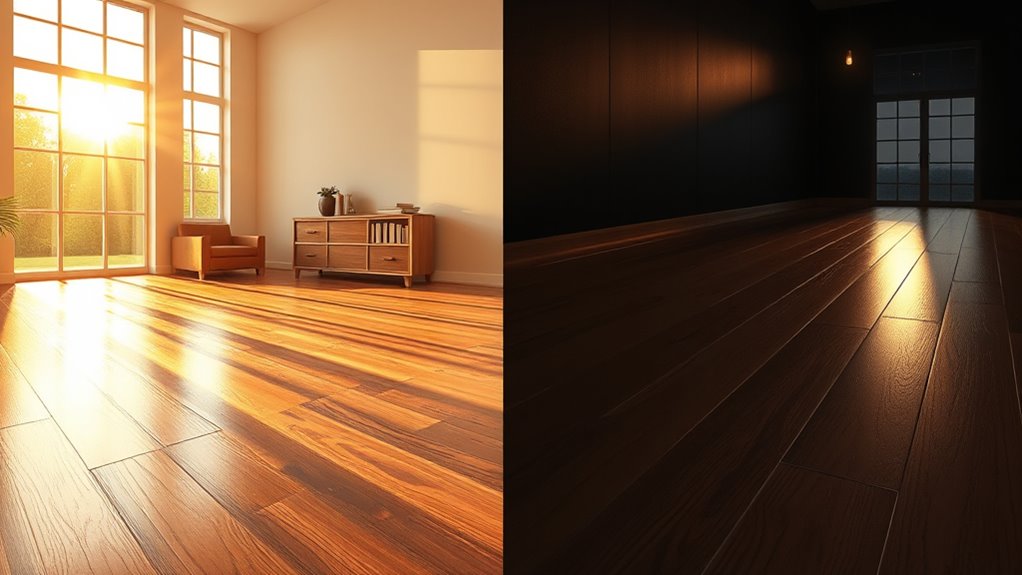
Timing plays a crucial role in maintaining the beauty and durability of your vinyl plank floors. When you choose the right time for cleaning and maintenance, you prevent unnecessary wear and tear. For example, cleaning during high-traffic periods can cause more dirt and debris to scratch the surface, reducing its lifespan. Conversely, cleaning when floors are dry and free of dust helps protect the finish. Additionally, waiting until floors are completely dry before walking on them prevents smudges and streaks. Scheduling maintenance during appropriate times also allows you to avoid rushing, ensuring you use gentle cleaning methods that preserve the floor’s integrity. Proper timing ensures your vinyl floors stay looking new longer and resist damage caused by improper care. Recognizing the importance of textile line in choosing cleaning products can further enhance your maintenance routine.
Advantages of Cleaning During the Day

Cleaning your vinyl plank floors during the day offers several practical benefits. First, you can easily access natural light, which helps you see dirt and debris more clearly, ensuring a thorough clean. Daytime cleaning also allows you to better monitor your cleaning process and catch any missed spots immediately. Additionally, cleaning during the day minimizes the chance of leftover moisture sitting overnight, reducing the risk of mold or warping. If you work from home or have other daytime activities, you can schedule cleaning when your space is less occupied, avoiding disruptions. Plus, sunlight helps dry floors faster, so you’re not left with damp surfaces. Furthermore, color accuracy in lighting conditions during the day can help you better assess the true appearance of your floors and cleaning results. Overall, daytime cleaning offers a practical, efficient way to keep your vinyl floors spotless while maintaining a healthy environment.
Benefits of Nighttime Floor Maintenance
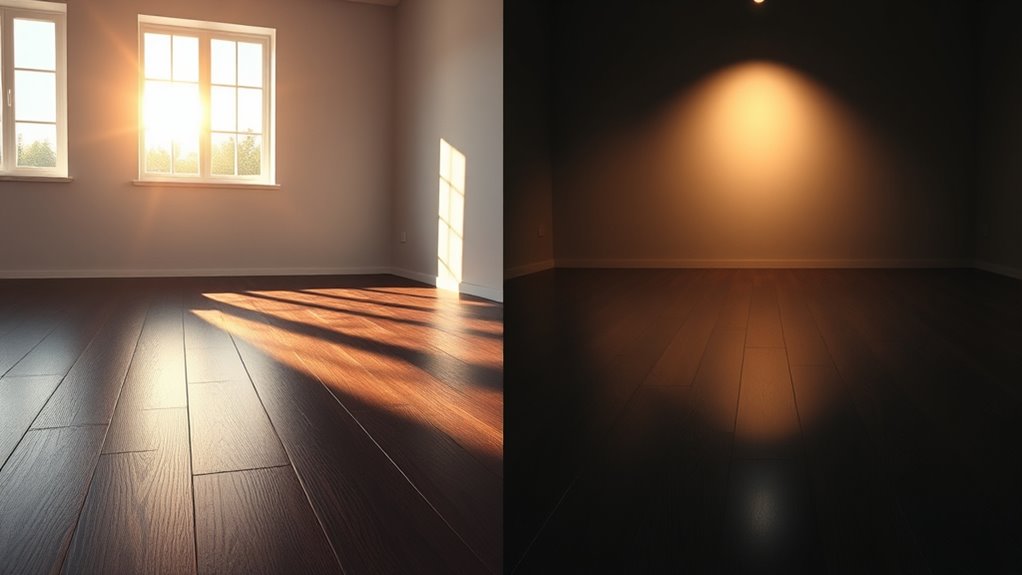
Nighttime floor maintenance offers unique advantages that can make your cleaning routine more effective. At night, there’s typically less foot traffic, so your vinyl plank floors stay cleaner longer and allow for more thorough cleaning without disruption. You can run your vacuum or mop without worrying about blocking pathways or creating hazards for daytime visitors. Additionally, cleaning at night minimizes the risk of dirt and debris settling back on freshly cleaned floors during busy periods. Cooler nighttime temperatures can also enhance drying times for mops and sealants, leading to a more polished finish. Plus, nighttime maintenance often fits better into busy schedules, letting you focus on other tasks during the day. Incorporating a whole-house water filtration system can further improve your home’s cleanliness and reduce the frequency of deep cleaning. Overall, cleaning floors at night keeps your space looking pristine and reduces interruptions during peak hours.
Potential Risks of Day Runs on Vinyl Plank Floors

Doing your day runs on vinyl plank floors can expose them to more moisture, which may lead to swelling or warping over time. This increased exposure also raises the risk of potential damage, especially if spills aren’t cleaned promptly. Being aware of these risks helps you protect your floors and keep them looking their best. To further safeguard your flooring, consider using protective fabric decorating markers to mark or label areas prone to spills and moisture.
Increased Moisture Exposure
Because daytime runs often involve more exposure to humidity and spills, vinyl plank floors are at greater risk of moisture damage during these periods. Increased moisture can lead to warping, buckling, or mold growth if not managed properly. To illustrate, consider common sources of moisture during the day:
| Source | Impact on Vinyl Floors |
|---|---|
| Humidity | Causes expansion and contraction |
| Spills (water, drinks) | Seepage into seams, swelling |
| Wet footwear | Transfers moisture onto surface |
| Cleaning agents | Potentially corrosive if not suitable |
Being aware of these risks helps you take preventive steps, like timely cleaning and controlling humidity, to protect your floors during daylight hours. Additionally, implementing proper ventilation can reduce moisture buildup and further safeguard your flooring.
Potential Floor Damage
Day runs on vinyl plank floors can pose significant risks if you’re not careful. During the day, exposure to direct sunlight and higher temperatures can cause the vinyl to expand and warp over time. This thermal expansion may lead to buckling or gaps, compromising the floor’s integrity. Additionally, daytime humidity fluctuations can cause moisture to seep in, especially if there are existing seams or damage. Heavy foot traffic during the day can also accelerate wear and tear, dulling the surface and increasing the risk of scratches. Using harsh cleaning products or excessive water during daytime cleaning can further damage the vinyl. Furthermore, proper maintenance practices are essential to prevent long-term damage and preserve the floor’s appearance and durability.
Common Challenges of Night Runs on Vinyl Flooring

Night runs on vinyl floors can lead to more dirt buildup since cleaning might be less frequent. You also face a higher slip risk due to reduced visibility and possibly wetter conditions. Being aware of these challenges helps you take steps to protect your flooring during nighttime maintenance. Additionally, proper scheduling ensures that cleaning routines are effective and minimize potential damage or safety hazards.
Increased Dirt Accumulation
Increased dirt accumulation is a common challenge when running on vinyl floors at night, especially since dust and debris tend to settle more visibly in low-light conditions. You might notice more specks and smudges, making your floors look dirty even after cleaning. This can be frustrating, especially if you’re trying to keep your space pristine. Here are four reasons why dirt builds up more at night:
- Reduced visibility makes dirt less noticeable during the day.
- Less frequent cleaning schedules due to darker hours.
- Dust settles more easily without air circulation.
- Nighttime foot traffic stirs up dust that settles quickly.
- Additionally, cleaning frequency often decreases during nighttime hours, contributing to dirt buildup.
This buildup can lead to a dull appearance and may require more frequent cleaning to maintain the floor’s beauty.
Higher Slip Risks
The accumulation of dust and debris in low-light conditions can considerably increase the risk of slipping on vinyl floors during nighttime runs. When visibility is limited, you might overlook small spills or scattered debris, making them more hazardous. Additionally, dust particles and dirt can settle into the textured surface of vinyl planks, creating uneven footing. Wet or damp areas, common during evening cleaning, further heighten slip risks. Without proper lighting, these hazards become harder to detect quickly, increasing the chance of accidents. To minimize this, verify the area is well-lit before starting your night runs. Regularly sweep or vacuum to remove loose debris, and use appropriate cleaning solutions to prevent residue buildup. Ensuring your headphones are properly paired and functioning can help you stay alert to your surroundings and avoid accidents. Staying cautious and prepared helps protect you from slipping hazards during nighttime maintenance.
How Lighting Conditions Affect Cleaning Effectiveness
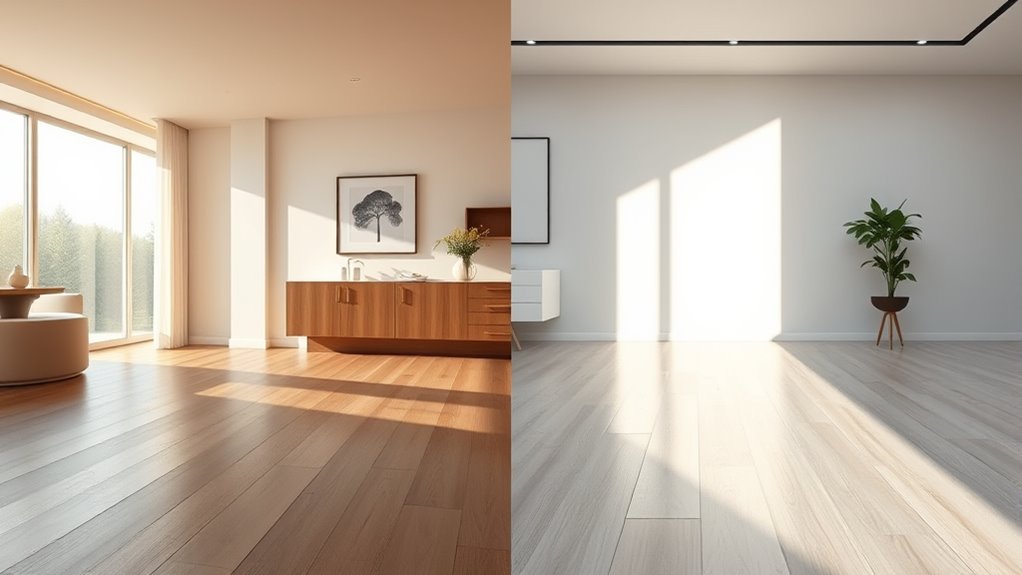
Lighting conditions play a crucial role in how effectively you can clean vinyl plank floors. Bright, natural light reveals dirt and smudges, motivating you to give a thorough clean. Dim lighting, however, can hide grime, making you unsure if your floor is truly clean. Poor lighting might make you miss spots, leading to frustration and a sense of unfinished work. Conversely, proper lighting boosts your confidence and satisfaction in your cleaning routine. Additionally, understanding the cookie categories used on cleaning websites can help you maintain your privacy while researching the best cleaning tips.
Noise Levels and Disruption Considerations

When cleaning vinyl plank floors, considering noise levels and disruptions is just as important as lighting. If you choose to clean during the day, you’ll likely minimize noise complaints from neighbors or other household members. Daytime cleaning allows you to operate vacuums and mops when others are awake and active, reducing the chance of disturbing naps or late-night activities. Conversely, cleaning at night can be disruptive, especially in shared living spaces or apartments with thin walls. The noise from vacuum cleaners, mops, or other equipment can disturb sleep or quiet time. To avoid conflicts, schedule louder tasks during the day and save lighter, quieter cleaning for the evening. Being mindful of noise helps maintain harmony and ensures your cleaning routine doesn’t interfere with others’ comfort.
Environmental Factors Influencing Cleaning Schedules

Environmental factors such as humidity, temperature, and air quality can substantially influence the timing of your cleaning schedule. When humidity is high, floors may feel sticky or develop mold, so cleaning during drier periods helps prevent damage. Temperature fluctuations can cause vinyl planks to expand or contract, making early morning or late evening ideal for cleaning. Poor air quality, like during pollen season or pollution, can settle on floors quickly, prompting more frequent cleanings. Consider these emotional impacts:
- *Avoid damage caused by excessive moisture or dryness.*
- *Protect your floors from warping and cracking.*
- *Maintain a fresh, clean environment for your family.*
- *Enjoy peace of mind knowing your schedule adapts to natural conditions.*
Adjusting your cleaning times based on these factors keeps your vinyl floors looking their best.
Best Practices for Day and Night Floor Maintenance

To keep your vinyl plank floors looking their best, you should follow specific maintenance tips for both day and night. During the day, safeguard your floors from scratches and spills, while at night, focus on gentle cleaning methods to remove dust and debris. Applying these best practices ensures your floors stay beautiful and durable over time.
Nighttime Cleaning Tips
Cleaning your vinyl plank floors at night requires a gentle approach to prevent damage and keep them looking their best. To do this effectively, follow these tips:
- Use a soft microfiber mop to avoid scratches and gently pick up dust and dirt.
- Opt for a pH-neutral cleaner designed for vinyl floors to protect the surface’s integrity.
- Avoid excessive water; dampen the mop just enough to clean thoroughly without oversaturating.
- Steer clear of harsh chemicals and abrasive tools that can dull or scratch the finish.
Daytime Protection Strategies
Protecting your vinyl plank floors during the day involves implementing simple yet effective strategies to prevent damage. Start by placing doormats at every entrance to trap dirt and moisture that can scratch or stain your floors. Use felt pads under furniture legs to avoid scratches when moving items around. Keep high-traffic areas clear of shoes, especially heels or heavy boots, which can cause dents. Regularly sweep or vacuum to remove debris that can cause surface wear. Consider using area rugs in busy spots to reduce foot traffic impact. Immediately clean up spills to prevent staining or warping. Lastly, avoid dragging heavy objects across the floor, and lift them instead. These practices help maintain your vinyl plank floors’ appearance and lifespan during daytime activities.
Tips for Choosing the Optimal Cleaning Time for Your Vinyl Floors
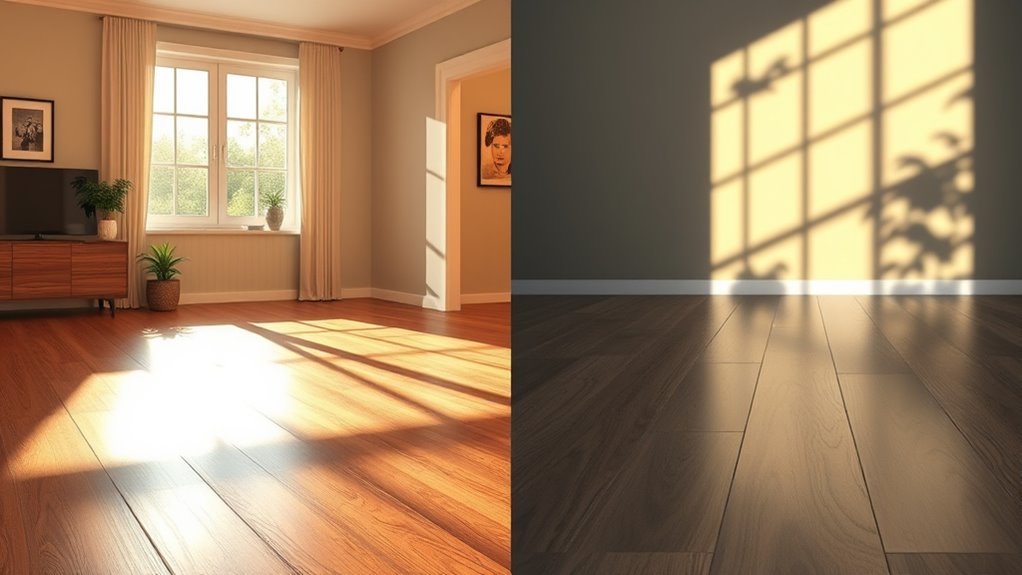
Choosing the right time to clean your vinyl floors can make a significant difference in their longevity and appearance. Pick a time when your home is quiet, so you can focus and avoid rushing. Consider these tips:
- Clean during low-traffic hours to prevent dirt from spreading or settling deep.
- Schedule cleaning when the floors are dry to prevent slipping or streaks.
- Avoid cleaning right before heavy foot traffic or after spills to maximize effectiveness.
- Choose a time when your cleaning supplies are ready, so you don’t interrupt your rhythm.
Frequently Asked Questions
How Do Temperature Variations Affect Vinyl Plank Floor Cleaning at Different Times?
Temperature variations can impact your vinyl plank floor cleaning by affecting how water and cleaning solutions interact with the surface. In colder temperatures, floors may be more brittle and prone to cracking, so you should avoid excessive moisture. Warmer temperatures help cleaning products work better and dry faster, making your cleaning more effective. Always clean when the temperature is stable, and avoid extreme shifts to prevent damage and guarantee thorough cleaning.
Can Cleaning During Certain Hours Damage Vinyl Floors?
Think of your vinyl floors as delicate dance partners—they can be easily damaged if you don’t respect their rhythm. Cleaning during certain hours, especially when using harsh chemicals or excessive water, can cause warping or discoloration. Avoid cleaning during extreme heat or cold to prevent damage. Stick to gentle cleaning in moderate conditions, and you’ll keep your floors looking stunning without risking harm. Your floors will thank you!
What Are the Best Cleaning Products for Day Versus Night Cleaning?
For day cleaning, use gentle, pH-neutral cleaners that won’t damage your vinyl floors or leave residues, ensuring they look shiny and clean. At night, opt for milder products and avoid harsh chemicals that might linger or cause discoloration. Always read labels carefully, dilute products properly, and use soft mops or cloths. This way, you protect your floors and keep them looking their best, regardless of the time.
How Does Foot Traffic Influence Scheduling for Vinyl Floor Maintenance?
Foot traffic influences your scheduling by guiding when you should clean and maintain your vinyl floors. Heavy traffic demands more frequent cleaning, possibly daily, to remove dirt and prevent damage, while lighter traffic allows for extended intervals between cleanings. You should schedule deep cleaning or maintenance during low-traffic times, like nights or weekends, to avoid disruption and ensure the floors stay pristine and durable. Proper timing keeps your floors looking their best longer.
Are There Specific Lighting Conditions That Improve Cleaning Effectiveness?
Bright, natural light from windows helps you see dirt and debris clearly, making cleaning more effective. Avoid cleaning in dim or overly harsh lighting, as shadows can hide grime or cause you to miss spots. If possible, choose a time when sunlight is abundant, like late morning or early afternoon, to guarantee your vinyl plank floors get a thorough clean. Proper lighting boosts your confidence in achieving a spotless finish.
Conclusion
Choosing between day and night for cleaning your vinyl plank floors is like balancing on a tightrope—you want to avoid disruptions while keeping your floors pristine. By understanding the benefits and risks, you can pick the best time that suits your schedule and environment. With mindful planning, you’ll maintain shiny, durable floors that look as good as new, no matter when you decide to clean. Your floors will thank you for the thoughtful care!
